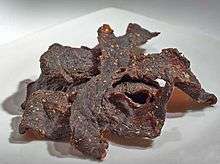Sukuti
Sukuti (Nepali: सुकुटी) is a dried meat product of Nepal origin but also use in Himalayan part of India and Tibet usually made from buffalo, and sometimes from lamb or goat. It is a staple dish of the Limbu and Gurung people.[1] Limbu pronunciation: Sakhekya.[2] It was used as a source of protien and also to add variety to diet during winter seasons in the mountain areas. Today food is generally available most year round among mountain communities so Sukuti is a delicacy to be eaten at times. Sukuti is one of Nepal's many types of meat product, it can be fried and eaten in many ways.
 | |
| Alternative names | Dried meat |
|---|---|
| Course | Snacks |
| Place of origin | Nepal, Himalayan part of India and Tibet |
| Main ingredients | Buffalo, lamb and goat |
History
Before time during animal sacrifice had taken place in the temples. In the presence of his kin, the priest had praised the buffalo before the shrine of the gods and had smeared the head of the sacrifice with vermilion powder and flowers. The blood sacrifice was given to the gods, and the head was raised in the sanctuary. The household was busy moving the buffalo into the kitchens, to be washed up. Not a single piece, organs or bones were wasted, and all were used to cook a wide range of delicious dishes. Some meat was sent to be cooked for dinner that day, and the rest were to be dried and processed later in the fridge, in gravy, fried, barbeque, grilled, braised, steamed. In Nepal, people did not always indulge in the meat before a well-off urban life with restaurants and stores, and if they had the chance, they missed nothing. In the difficult winters, lean dried meat came to the rescue during the supply of food. It was a must. This is now an explosion of deliciousness.[3]
Method
To produce dried meat, the meat of any animal or bird shall be cut into thin strips and the fat shall be carefully removed. The meat strips hang on the roof as well above Chulho (wood fire smoke) to make it dry. This often gave an unpleasant smell so that the strips are often coated with spices such as salt, cumin, pepper, chilli powder and turmeric, sometimes ginger and garlic paste are also used before they are spread on a clean cloth to dry in the sun. This helped the meat to have an intense flavour and kept the insects at bay. When the humidity is removed and the strips get dry, the meat is processed. It can also be refreshed when it is cooked in gravel, but Sukuti is made from it, the best way to prepare dry meat.[4]
Making and Serving
Sukuti is cooked in the kitchens so long as the Nepalese people dry meat. There are several ways to make sukuti as depends on the taste. But the main methods which are very popular among the people of Nepal is deep frying or grilled roast method. To make sukuti, a combination of salt, pepper, cumin, turmeric, and chilli powder are taken out of reservations and browned or roast, then pounded with spices. Sukuti is versatile, perfect with chopped onions and tomatoes, topped with green onions or leaves of coriander. When the dried meat mixes well, it is then combined with an accessible amount of butter, with spices, onions and even ginger and garlic paste. There is no need to break the sweat that makes this nifty appetiser. The resulting snack is spicy, each bite containing chunks of meat and spices, garlic, ginger, onion, tomato, salt, and chilli, alternating in each bite between chewy and crispy, and is utterly delicious..[3] You are happy to enjoy your chewy appetiser.
See also
References
- https://www.lalman.com/limbu-cultural-trek.php
- p.505 A Grammar of Limbu By George van Driem
- "Sukuti:The Dry Meat Delicacy". ECSNEPAL. Retrieved 5 May 2018.
- "Boss Nepal". www.bossnepal.com.